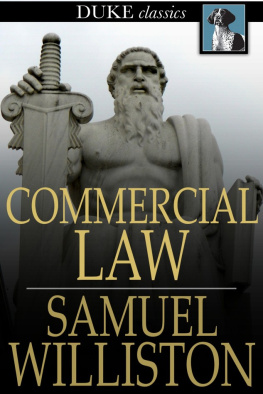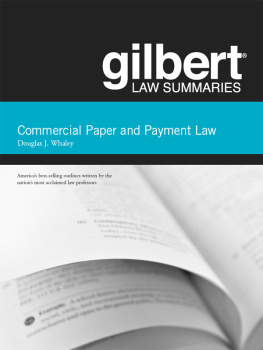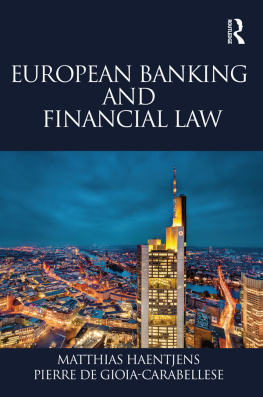COMMERCIAL LAW
* * *
SAMUEL WILLISTON
RICHARD D. CURRIER
RICHARD W. HILL
*
Commercial Law
First published in 1921
ISBN 978-1-62013-301-9
Duke Classics
2013 Duke Classics and its licensors. All rights reserved.
While every effort has been used to ensure the accuracy and reliability of the information contained in this edition, Duke Classics does not assume liability or responsibility for any errors or omissions in this book. Duke Classics does not accept responsibility for loss suffered as a result of reliance upon the accuracy or currency of information contained in this book.
Contents
*
Preface
*
The Institute standard course of study in "Commercial Law" is notintended to make lawyers, but simply to impart to bankers sufficientknowledge of law to enable them to act in accordance with establishedlegal principles, and refer doubtful questions to a lawyer. It is notusurping the functions of a lawyer for a banker to know his legal rightsand responsibilities. The banker who does not appreciate the importanceof this knowledge, eventually learns from experience, sad or otherwise,that he has neglected an important part of the training necessary tocarry on his business with safety and confidence. This text-book isbased on the splendid work, originally prepared for the Institute, bySamuel Williston, Weld Professor of Law in Harvard Law School. To thisoriginal matter, however, much new material has been added, cases havebeen cited, and new chapters on Master and Servant, Estates and Trusts,Bills and Notes, and Torts and Crimes added. The work of preparing"Commercial Law" has been done jointly by Richard D. Currier, Presidentof the New Jersey Law School, and Richard W. Hill, member of the NewYork Bar and Secretary of the American Institute of Banking. The mainpurpose of this book is to teach bankers to recognize the danger signalsin law, when they appear, and thus be able to distinguish between lawand law suits.
Institute Platform
*
Resolution adopted at the New Orleans Convention of the AmericanInstitute of Banking, October 9, 1919:
"Ours is an educational association organized for the benefit of thebanking fraternity of the country and within our membership may be foundon an equal basis both employees and employers; and in full appreciationof the opportunities which our country and its established institutionsafford, and especially in appreciation of the fact that the professionof banking affords to its diligent and loyal members especialopportunities for promotion to official and managerial positions, andthat as a result of the establishment and maintenance of the meritsystem in most banks a large number of Institute members have throughindividual application achieved marked professional success, we at alltimes and under all circumstances stand for the merit system and for thepaying of salaries according to the value of the service rendered.
"We believe in the equitable cooperation of employees and employers andare opposed to all attempts to limit individual initiative and curtailproduction, and, insofar as our profession is concerned, are unalterablyopposed to any plan purporting to promote the material welfare of ourmembers, individually or collectively, on any other basis than that ofefficiency, loyalty and unadulterated Americanism."
Who is a Banker?
*
A successful banker is composed of about one-fifth accountant, two-fifths lawyer, three-fifths political economist, and four-fifths gentleman and scholartotal ten-fifthsdouble size. Any smaller person may be a pawnbroker or a promoter, but not a banker.George E. Allen.
Introduction
*
DEFINITION OF LAW.The term "law" is used in many ways. We speak ofmoral law, law of gravity, divine law, and the like. In each case we aremaking proper use of the term, but in no instance are we using it aswe shall use it in this book. To illustrate: You find a beggar on yourfront porch when entering your house late at night. Suppose he shouldask you for food and lodging for the night. Although there is no otherhouse within five miles of your home, you refuse to take him in, or doanything for him. As a result he contracts pneumonia from exposure,because he is not able to proceed further. You would, nevertheless,not be liable in the sense in which we are using the term "law." But,you say, in an extreme case of this kind, it is one's duty to act. Wegrant it, but to be accurate, you must preface your proposition withthe statement, "under the moral law" or "under divine law it is one'sduty to act in such a case." However much it is to be regretted thatmoral or divine law sometimes does not harmonize with "law" as we shalltreat it, we must, nevertheless, recognize that fact. Law, as viewed bythe jurist, and this is the way we, as students, are to consider it, isdefined by Blackstone to be "A rule of civil conduct prescribed by thesupreme power in the State, commanding what is right, and prohibitingwhat is wrong." Referring again to our illustration, is it not easy tosee that it would be impracticable in the present condition of societyfor the legislature of California, for example, to pass a law whichshould, in that State, constitute "a rule of civil conduct" commandingthat every one "shall be his brother's keeper" and for a violationthereof "shall be imprisoned for one year, or fined one thousanddollars, or both." However much we recognize the obligation of morallaw, jurists and legislators cannot ignore the fact that society iscomposed of ordinary human beings, still far from perfection. Assuming,although perhaps it is doubtful, that it is within the power of thelegislature of California to pass such an act as has been suggested,there are not courts enough in the whole United States to decide thecases which would arise in New York City alone in attempting to applythe provisions of such an act. On second thought, then, it is not sucha startling proposition for us to learn that "law" is not synonymouswith the same term when used in referring to natural law, moral law, andthe like. Much has been written on the essential nature of "law" as weshall use the term. The time-honored definition of Blackstone, which wehave quoted, is confessedly imperfect. The last clause, "commanding whatis RIGHT, and prohibiting what is WRONG" has been much criticized, andMr. Chitty has modified it to "commanding what shall be done, and whatshall not be done." To-day, to attempt to buy a bottle of light wine ata hotel does not seem to many of us intrinsically WRONG, but legally,under existing laws, it is, and so perhaps Mr. Chitty's modification ofBlackstone's definition does bring out the correct idea more clearly.For our purpose, these two definitions are sufficient.
THE SYSTEMS OF LAW.There are two chief systems of law in use amongcivilized peoples to-day, the Roman or civil law, and, the English orcommon law. The Roman, or civil law (Roman law is spoken of as civillaw, from the Latin "civilis," belonging to a citizen) as its nameimplies, originated in Rome. As the city of Rome developed into theRoman Empire, its law became that of the ancient world. It was finallycodified by the Roman Emperor Justinian, in the year 530 A.D., and waseventually absorbed, from the twelfth to the eighteenth century, intothe law of modern Europe. It is the basis of the systems of law used inthe countries of continental Europe, Central and South America, and allFrench, Spanish, Portuguese, and Dutch colonies or countries settled bythose peoples.







